 Did you know that many of today’s modern dentists can treat sleep disorders, particularly snoring and sleep apnea? Millions of people suffer from sleep apnea all over the world, an estimated 22 million in the United States alone. What is sleep apnea? What are its symptoms? Is it dangerous? Can it be treated? Today we are going to answer these questions with a sleep apnea Q and A.
Did you know that many of today’s modern dentists can treat sleep disorders, particularly snoring and sleep apnea? Millions of people suffer from sleep apnea all over the world, an estimated 22 million in the United States alone. What is sleep apnea? What are its symptoms? Is it dangerous? Can it be treated? Today we are going to answer these questions with a sleep apnea Q and A.
You Are Getting Sleepy…
When it’s time for a dental visit, especially for a filling, root canal, extraction, or implant, you want to be comfortable. We want you to be comfortable, too. Here at Pecan Tree Dental that is why we offer sedation, so our patients’ will feel at ease and relaxed during treatment. So many people avoid their dental appointments due to fear and anxiety. When you start skipping dental appointments issues can become more serious and complex. It is best to attend your preventive appointments, and if an issue is discovered, take care of it early. Have no fear, pretty soon you will hear us saying..you are getting sleepy…
(more…)
A Root Canal? Really?
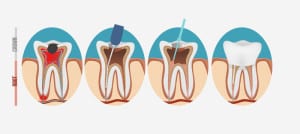 If that’s your first thought when your dentist mentions root canal treatment, you can stop and think again. Root canal treatment isn’t really as bad as you might think. You may have heard horror stories years ago about root canals or seen something on a sitcom, but root canals aren’t any worse than getting your tooth filled. Take the true and false quiz below to find out how much you know about root canals and if you really need to say “A root canal? Really?”
If that’s your first thought when your dentist mentions root canal treatment, you can stop and think again. Root canal treatment isn’t really as bad as you might think. You may have heard horror stories years ago about root canals or seen something on a sitcom, but root canals aren’t any worse than getting your tooth filled. Take the true and false quiz below to find out how much you know about root canals and if you really need to say “A root canal? Really?”
Why You May Not Be A Candidate For An Implant
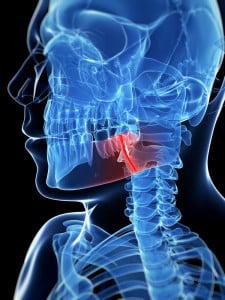 Dental implants are a permanent and stable way to replace a lost tooth. Although the procedure is complex and invasive, it is as if you’ve never lost a tooth. An implant requires the surgical “implant” of a titanium post into your jawbone. The post then osseointegrates with the bone becoming one. This provides a base as stable as the original tooth root. The base is then topped with a crown that is usually fabricated from porcelain because the color and translucency of the material mimics natural teeth. If you are considering such treatment, there are reasons you may not be a candidate for an implant.
Dental implants are a permanent and stable way to replace a lost tooth. Although the procedure is complex and invasive, it is as if you’ve never lost a tooth. An implant requires the surgical “implant” of a titanium post into your jawbone. The post then osseointegrates with the bone becoming one. This provides a base as stable as the original tooth root. The base is then topped with a crown that is usually fabricated from porcelain because the color and translucency of the material mimics natural teeth. If you are considering such treatment, there are reasons you may not be a candidate for an implant.
Facts About Tooth Extraction
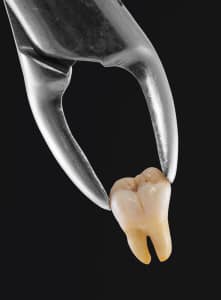 There are times when a tooth is too damaged to save with a root canal, filling, or by crowning. You have to have natural tooth structure to work with, and if your natural tooth structure is missing or too far damaged you may need to have the tooth extracted. That is why dentists today believe in minimally invasive treatments. That means that they try to remove very little of the natural tooth leaving as much tooth intact as possible in case of future problems. Once you extract a tooth, the gap it leaves can lead to considerable problems. Read on to find out more facts about tooth extraction.
There are times when a tooth is too damaged to save with a root canal, filling, or by crowning. You have to have natural tooth structure to work with, and if your natural tooth structure is missing or too far damaged you may need to have the tooth extracted. That is why dentists today believe in minimally invasive treatments. That means that they try to remove very little of the natural tooth leaving as much tooth intact as possible in case of future problems. Once you extract a tooth, the gap it leaves can lead to considerable problems. Read on to find out more facts about tooth extraction.
What Is Emergency Dentistry?
 Did you know that you could break a tooth biting into a soft sandwich? It has happened. What if it were a chicken bone? Imagine the damage that could be done. Or what if you play hockey and you took an elbow to the mouth. Accidents happen and we are never really prepared. What if your tooth broke, but the filling stayed intact? Weird things can happen. If there is no pain should you run to the dentist? What if it’s a three day weekend? Can you wait a few days? What is a dental emergency?
Did you know that you could break a tooth biting into a soft sandwich? It has happened. What if it were a chicken bone? Imagine the damage that could be done. Or what if you play hockey and you took an elbow to the mouth. Accidents happen and we are never really prepared. What if your tooth broke, but the filling stayed intact? Weird things can happen. If there is no pain should you run to the dentist? What if it’s a three day weekend? Can you wait a few days? What is a dental emergency?
Don’t Be Partial
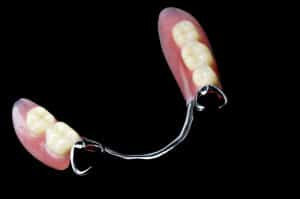 It’s easy to be partial toward something. You can be partial toward a color, food, person, store, name brand, product, or even a dental treatment. Are you partial toward dentures, veneers, bridges, or…partials? Do you know the difference between a full denture and a partial denture? A full denture is treatment for people who are missing all of their teeth in their upper or lower arch or both. A partial, however, can replace one tooth, a few teeth that, or several. Don’t be partial until you learn about partials.
It’s easy to be partial toward something. You can be partial toward a color, food, person, store, name brand, product, or even a dental treatment. Are you partial toward dentures, veneers, bridges, or…partials? Do you know the difference between a full denture and a partial denture? A full denture is treatment for people who are missing all of their teeth in their upper or lower arch or both. A partial, however, can replace one tooth, a few teeth that, or several. Don’t be partial until you learn about partials.
How Dentures Are Made
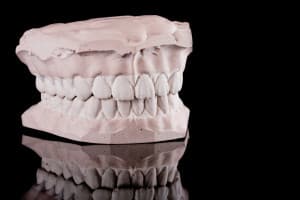 Most everybody is familiar with dentures. If a family member doesn’t have them, then you probably have seen them on a TV sitcom. Even the children’s cartoon Rugrats had an episode about the grandpa’s dentures. Dentures take a bad rap and are often the butt of jokes, but in reality they are an important dental asset. Without dentures, edentulous (fully toothless) patients would have difficulty eating healthy foods. They would be embarrassed to smile, or to even leave the house. Dentures are a physical and psychological remedy. Do you ever wonder how dentures are made?
Most everybody is familiar with dentures. If a family member doesn’t have them, then you probably have seen them on a TV sitcom. Even the children’s cartoon Rugrats had an episode about the grandpa’s dentures. Dentures take a bad rap and are often the butt of jokes, but in reality they are an important dental asset. Without dentures, edentulous (fully toothless) patients would have difficulty eating healthy foods. They would be embarrassed to smile, or to even leave the house. Dentures are a physical and psychological remedy. Do you ever wonder how dentures are made?
Which Type Of Crown Is Best For You?
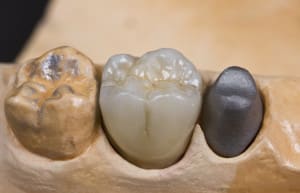 Dental crowns can be fabricated from several different types of materials. Each material has its advantages and is used for particular reasons. If you require crown treatment, your dentist will discuss the types of crowns available and what they are best used for. Factors to consider include strength, durability, aesthetics, extent of the treatment, and cost. Below we list the types of crowns and their favored treatment modalities so we can help you decide which type of crown is best for you.
Dental crowns can be fabricated from several different types of materials. Each material has its advantages and is used for particular reasons. If you require crown treatment, your dentist will discuss the types of crowns available and what they are best used for. Factors to consider include strength, durability, aesthetics, extent of the treatment, and cost. Below we list the types of crowns and their favored treatment modalities so we can help you decide which type of crown is best for you.
(more…)
Learn About Dental Bridges By Taking Our Quiz
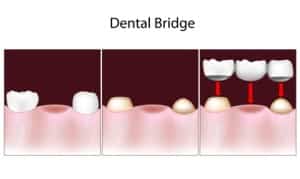 Your dentist is highly educated and experienced regarding how to perform various dental procedures and what problems each type of procedure is for. They will give you their advice and share their expertise, but the decision is ultimately yours. That’s why it is good to know as much about your options as possible. Reading our dental blogs before speaking to the dentist is one way to learn about treatment options. Our blogs can give you an idea of what is available, what to expect, how the procedure is done, how long it takes, and more. Today you can learn about dental bridges by taking our quiz.
Your dentist is highly educated and experienced regarding how to perform various dental procedures and what problems each type of procedure is for. They will give you their advice and share their expertise, but the decision is ultimately yours. That’s why it is good to know as much about your options as possible. Reading our dental blogs before speaking to the dentist is one way to learn about treatment options. Our blogs can give you an idea of what is available, what to expect, how the procedure is done, how long it takes, and more. Today you can learn about dental bridges by taking our quiz.








